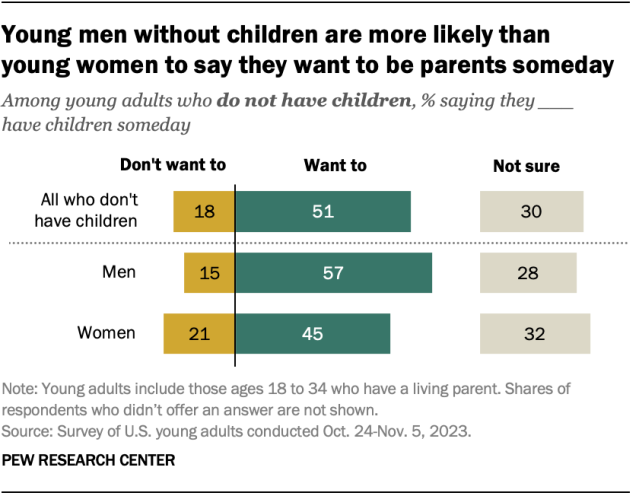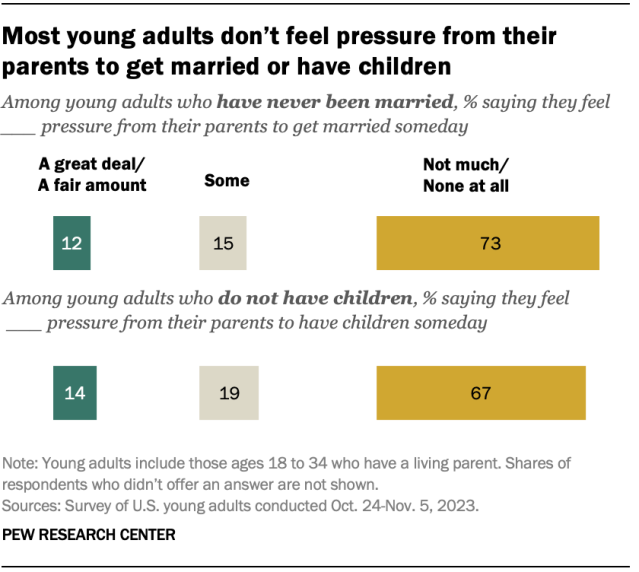
Today’s young adults are reaching key milestones like marriage and parenthood later in life than their parents’ generation did. Still, most Americans ages 18 to 34 who’ve never been married say they’d like to marry someday. And about half of young adults in that age group who don’t have children say they’d like to be parents eventually.
Pew Research Center conducted this study to better understand how young adults who aren’t married or do not have children are thinking about marriage and parenthood. This analysis is primarily based on a survey conducted from Oct. 24 to Nov. 5, 2023, as part of a broader research project examining the relationship between young adults and their parents. The survey included 1,495 U.S. adults ages 18 to 34 with at least one living parent who they have contact with (excluding any panelists currently enrolled in high school). Findings from the other 2023 survey are based on all U.S. adults, with or without a living parent.
Everyone who took part in the surveys is a member of the Center’s American Trends Panel (ATP), an online survey panel that is recruited through national, random sampling of residential addresses. Address-based sampling ensures that nearly all U.S. adults have a chance of selection. The survey is weighted to be representative of the U.S. adult population by gender, race, ethnicity, partisan affiliation, education and other categories.
Here are the questions used for this analysis, along with responses, and the survey methodology.

Among adults ages 18 to 34, 69% of those who have never been married say they want to get married one day. About a quarter (23%) say they’re not sure, and 8% say they don’t want to get married. Men and women are about equally likely to say they want to get married.
When asked about having children, 51% of young adults who are not parents say they would like to have children one day. Three-in-ten say they’re not sure, and 18% say they don’t want to have children.
While 57% of young men say they want children one day, a smaller share of young women (45%) say the same.
Do young adults feel pressured by their parents to get married or have children?
Most young adults say they don’t feel pressure from their parents to get married. Among those who’ve never been married, 73% say they don’t feel much or any pressure from their parents to do so. Another 15% say they feel some pressure, and 12% say they feel a great deal or a fair amount of pressure.

Similarly, a majority of young adults who don’t have children (67%) say they don’t feel much or any pressure from their parents to do so. About one-in-five (19%) say they feel some pressure to have kids, and 14% say they feel a great deal or a fair amount of pressure.
Feeling pressure from parents to do either of these things doesn’t differ by gender.
How important are marriage and parenthood to living a fulfilling life?
Another 2023 Pew Research Center survey found that American adults of all ages tend to say job satisfaction and having close friends are very important in order to live a fulfilling life. They are much less likely to say the same about being married or having children.
Among all adults ages 18 to 34, 20% say being married is extremely or very important for people to live a fulfilling life, and 22% say having children is extremely or very important. For comparison, 68% say the same about having a job or career they enjoy, and 62% say this about having close friends. There are no gender differences in young adults’ views of the importance of getting married or having children.
Note: Here are the questions used for this analysis, along with responses, and the survey methodology.
